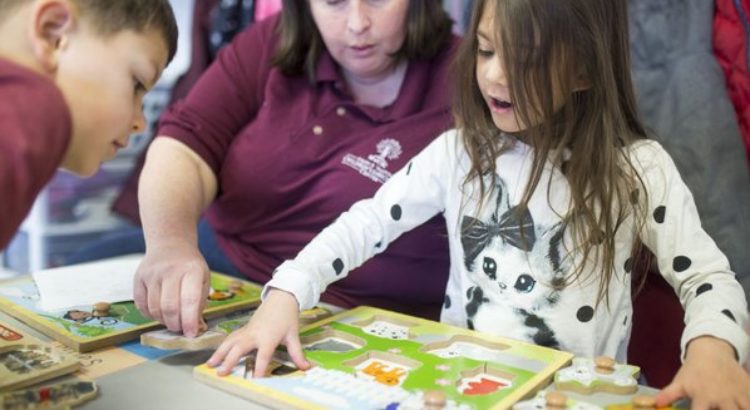EEUU/March 13, 2018/By Stacy Ryburn/Source: http://www.nwaonline.com
Pre-K options are steadily increasing as Northwest Arkansas’ population grows and parents want more choices, early childhood education professionals say.
About 300 licensed preschools or day cares in the region are licensed with the state Division of Child Care and Early Education. Facilities run the gamut of public, private, nonprofit, home and faith-based.
Parents often face tough decisions when it comes to balancing work schedules with finding the right day care or preschool, said Doug Walsh, executive director for business and operations at the Jean Tyson Childhood Development Center at the University of Arkansas. The difficulty compounds for lower-income families who can’t afford a traditional preschool and need a place for their children to go during the day, he said.
«The private sector, both nonprofit and for-profit, is certainly popping up to try to fill in the gap,» Walsh said. «You see the variety across the board.»
Greater investment and variety in pre-K education equates to a net positive effect on the community, Walsh said.
Studies show children who attend preschool are better prepared academically by age 5, remain committed to school at 14 and have higher high school graduation rates than those who don’t, according to the Center for Public Education, a national database on public education.
Early education can make a huge difference in a child’s life, especially those who don’t speak English in a primarily English-speaking community, said Darlene Fleeman, director of Springdale’s pre-K program.
Springdale children entering school often haven’t experienced group care where they can hone English language skills, which better prepares them for kindergarten and onward, she said. Of the district’s 21,516 students, 46 percent come from a Spanish-speaking home, 12 percent come from a Marshallese home and 3 percent speak a language other than English, according to Springdale Public Schools spokesman Rick Schaeffer. That doesn’t mean the students aren’t proficient in English; it’s just not the primary language spoken in the home, he said.
State money has played a key role in increasing the quality of early childhood education, Fleeman said. Springdale pre-K is paid for through grants and follows the Arkansas Better Chance program rules and regulations under the state Department of Human Services.
Early child care providers can become accredited through the state’s Better Beginnings program, which is based on a three-star system. One star means the provider is ready to pursue accreditation. Two stars mean written plans have been put in place and three stars mean those plans have been implemented, said Sunny Lane, director of development with the Helen R. Walton Children’s Enrichment Center in Bentonville. The center is a nonprofit organization dedicated to high-quality care and education for children six weeks through pre-K. It also has a training wing called the Early Childhood Initiative Center.
Just more than 60 percent of the licensed early child care providers in the region are accredited, Lane said. Next year, the Children’s Enrichment Center will expand its training and resource wing when it moves into a new building on J Street near the Amazeum and Crystal Bridges Museum of American Art.
With its current capacity the center can work with about 150 early child care providers, effectively training about 1,400 service professionals affecting more than 12,000 children, Lane said.
Accredited centers have a higher demand than those that don’t and almost always have a significant waiting list. The more and better training preschool teachers receive, the more accredited schools will emerge and the waiting lists will get shorter, Lane said.
«We’re helping them lay the groundwork,» Lane said.
Access is the biggest barrier to families seeking pre-K opportunities, said Candice Sisemore, founder of Teeny Tiny Preschool in Fayetteville. The school opened in October at the former community building of the Willow Heights public housing complex.
Teeny Tiny Preschool has scholarship opportunities for lower-income families and uses the Reggio Emilia approach to learning. The style respects a child’s sense of self and encourages expression through painting, sculpting, acting and other self-guided methods.
Finding the right preschool can be difficult enough, but the wait can last even longer for a lower-income family. It becomes a matter of what’s available, as opposed to which early education method is right for a child, Sisemore said.
However, the trend in Northwest Arkansas seems to be headed in the right direction, Sisemore said.
«There are lots of options,» she said. «It’s getting those to be accessible for all families that is the trick.»
Source:
http://www.nwaonline.com/news/2018/mar/11/region-s-options-bring-variety-choice-i/?news-arkansas-nwa






 Users Today : 16
Users Today : 16 Total Users : 35460033
Total Users : 35460033 Views Today : 24
Views Today : 24 Total views : 3418655
Total views : 3418655